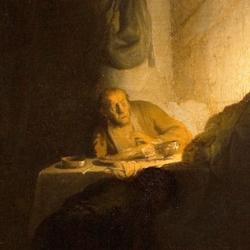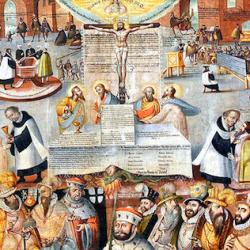Communio has been a key concept in Roman Catholicism over the past century, but David L. Schindler (Heart of the World, Center of the Church) observes that it has a more-than-ecclesial scope. It implies a certain relation between the church and the world, and a vision of the future of the world:
the whole world, in and through the Church, is destined for a transfiguring espousal with Jesus Christ. The espousal is meant to include human beings, not only in their individual but in their social nature as well: in their nature as extended into culture and hence into academic, political, and economic structures and institutions. The espousal is meant also to include cosmic entities. Clearly, the transfiguration intended for these latter will not lead to their participating—properly and as such in communio. That intended transfiguration must nevertheless be such that we can make sense of what the Catholic priest says daily in the preparation of gifts at Mass: “Blessed are you, Lord, God of all creation Through your goodness we have this bread to offer, which earth has given and human hands have made. . . . It will become for us the bread of life.” The “eucharistic” finality gathers up all of the purposes of bread, not replacing them but restoring them at a deeper and truer level. The “eucharistic” purpose is that for which bread—that is, all chemical-physical entities of the world—is first and most fundamentally created: to offer itself, through man, for Christic transformation and thereby for the glorification of the Father. (21–2)
Thus, “the Christian, in and through the Christ and the Church, is involved in a marriage with the world. This marriage is understood in the radical and comprehensive sense as a eucharistic exchange intended to leave not even the smallest particle of the cosmos unwed. . . . In the end, it is only in spousal-eucharistic union with God, in Jesus Christ through Mary-Church, that the creature is free(d) to be what it truly is as a creature” (23-4). Other Catholic conceptions of the church-world relation are defective because they accord the world “autonomy in the wrong sense; the church-world relation is understood too extrinsically; and the mutual engagement of church and world is understood in terms that are too power-(or machine-)like (i.e., political-external) in character” (25).
Protestants will want to make adjustments. I reject from Schindler’s Mariology, but can agree that Mary is a type of our heavenly mother Jerusalem. Yet for all Christians Schindler’s ecclesiologically-centered political theology has much to commend it.










